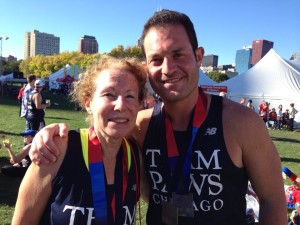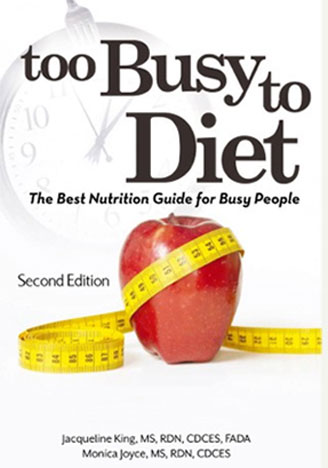Nutrition For Runners (and other endurance training)
in The Too Busy to Diet Blog on October 16, 2013
Written by Jennifer Martin, Dietetic Student at University of Illinois at Chicago

The Chicago Marathon was on Sunday, and this has been my third year in a row going to watch it. I always stand somewhere around 16th and Michigan (which is close to the finish line) and stare in awe as tens of thousands of runners sprint, jog, walk, or crawl past me to the end of the 26.2-mile journey. Although I come from a family of runners (my 61-year-old mother and my older brother ran and finished on Sunday), I’ve never been a big long-distance runner myself. Watching yet another marathon, though, I’m finally inspired enough to start training for races.
Training right means eating right, and people ask me all the time what they should eat before and after a run or other endurance workouts. I’ve put together some guidelines for you and (and me) to follow*.
Before a workout:
- Try to eat an hour before exercising. If you eat too soon before your workout, you may feel sick. Eat too early, and you may feel weak. One hour ahead will give you fuel while giving you some time to digest.
- If you’re like me and work out first thing in the morning, you may not want to wake up earlier just so you can eat. If this is the case, try eating a banana before running out the door. It’s very easy to digest, and you can take it on the go.
- Limit your pre-workout snack to 200 calories. Make it carbohydrate-based, and try something that sits well in your stomach. For snack suggestions, look at Frances Largeman-Roth’s article in US News (the link is below).
- There is a lot of research saying that you will burn more fat if you exercise on an empty stomach. You need to do what is best for you. I can’t have any food in my stomach if I’m running, but I need to eat before doing other forms of exercise such as lifting weights. You will burn calories no matter what by doing endurance exercise, so don’t limit food beforehand if you’re hungry. It can negatively affect your performance and prevent you from adequately training. If running with food in your stomach makes you feel sick, try going on a run first thing in the morning before you eat anything. Try playing around with options, and pay attention to how you feel during and after workouts.
After a workout:
- Don’t forget to eat! Try to get food into your system within two hours post-exercise. Your muscles need fuel to recover, and skipping meals will only hurt your future workouts.
- The best time to get carbs into your body is 15-20 minutes after a workout. You need to replace glycogen (stored energy) that you have burned off.
- Your post-workout meal can be heavier in protein than your pre-workout snack.
- Eat antioxidants (fruits, veggies, whole grains) to counteract oxidative damage that occurs in your body after intense workouts.
- Aim for 200-250 calories if you’re having a quick snack before a meal; go for 400 if you have more time to refuel.
In addition, don’t forget to hydrate before, during, and after your workout. Largeman-Roth suggests drinking an additional 4 to 8 ounces of water a day per 15 minutes of intense exercise, in addition to your regular 8 8-ounce glasses of water per day. This seems like a lot, but I’ve seen people go to the hospital for dehydration. You will feel and perform your best when you are properly hydrated.
I also get questions about whether people should drink water or electrolyte-based drinks such as Gatorade. As a rule of thumb, you don’t need electrolyte-based drinks unless you’re working out intensely for more than an hour or are sweating excessively in hot or humid weather. Our bodies are very good at replacing electrolytes through the food that we eat most of the time (but don’t neglect drinking water!).
Keep these guidelines in mind if you are going to do intense exercise, and I will do the same. The next time I write about sports nutrition, I will hopefully be signed up for a half marathon!
*You will need additional nutrition beyond these recommendations if you are training for and running a marathon, so be sure to consult a health professional about proper fueling and hydration in these cases.
Information from Frances Largeman-Roth, R.D.
Buy the Too Busy to Diet book
Get your copy of the definitive diet reference guide and healthy eating book today. Stop reading those misleading fad diet books and read an easy to follow book on how to lose weight and keep it off from actual Registered Dietitians.

Recent Posts
- Barbeque Turkey Meatloaf
- Pescado a la Veracruzana
- Juicy Pork Chops
- Rotasserie Chicken Casserole
- Grilled Salmon & Blueberry Salad